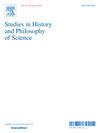Questioning local wisdom in Indonesian Indigenous research
IF 1.8
2区 哲学
Q1 HISTORY & PHILOSOPHY OF SCIENCE
引用次数: 0
Abstract
This article explores the shifting dynamics of local wisdom (kearifan lokal) as a research category within Indonesian academic discourse, particularly as reflected in journal publications that prominently feature the term in their titles. Although local wisdom is frequently equated with Indigenous knowledge, such conflation remains only partially accurate. While there are points of intersection, notable conceptual divergences persist underscoring the need to examine how local wisdom is understood, invoked, and positioned within the epistemological landscape of Indonesian scholarship. Drawing on a brief survey conducted through Publish or Perish software, the article outlines a provisional typology that captures how local wisdom is articulated across academic contexts. These findings suggest that local wisdom functions less as a stable or singular body of knowledge, and more as a discursive space shaped by a range of intellectual idealisms, situated commitments, and methodological compromises. Researchers engaging with this theme appear to navigate a delicate tension: between preserving the emic, often orally transmitted dimensions of local knowledge, and responding to disciplinary expectations rooted in scientific rationalism. At the same time, there is evidence of a latent ethnonationalist sentiment that further complicates the positioning of local wisdom within broader efforts to decolonize knowledge production in Indonesia.
质疑印尼原住民研究中的当地智慧
本文探讨了当地智慧(kearifan local)作为印度尼西亚学术话语中的一个研究类别的变化动态,特别是反映在期刊出版物中,这些出版物在其标题中突出了该术语。虽然当地的智慧经常等同于土著知识,但这种混淆仍然只是部分准确。虽然存在交叉点,但显著的概念分歧仍然存在,强调需要检查如何理解,调用当地智慧,并在印度尼西亚学术的认识论景观中定位。通过“发布或灭亡”软件进行的简短调查,本文概述了一个临时的类型学,捕捉了当地智慧如何在学术环境中表达出来。这些发现表明,地方智慧的功能与其说是一个稳定或单一的知识体系,不如说是一个由一系列知识理想主义、定位承诺和方法论妥协形成的话语空间。研究这一主题的研究人员似乎在一种微妙的张力中导航:在保存本地知识的主体(通常是口头传播的维度)和回应根植于科学理性主义的学科期望之间。与此同时,有证据表明,一种潜在的民族主义情绪进一步复杂化了在印度尼西亚知识生产非殖民化的更广泛努力中当地智慧的定位。
本文章由计算机程序翻译,如有差异,请以英文原文为准。
求助全文
约1分钟内获得全文
求助全文
来源期刊

Studies in History and Philosophy of Science
管理科学-科学史与科学哲学
CiteScore
2.50
自引率
10.00%
发文量
166
审稿时长
6.6 weeks
期刊介绍:
Studies in History and Philosophy of Science is devoted to the integrated study of the history, philosophy and sociology of the sciences. The editors encourage contributions both in the long-established areas of the history of the sciences and the philosophy of the sciences and in the topical areas of historiography of the sciences, the sciences in relation to gender, culture and society and the sciences in relation to arts. The Journal is international in scope and content and publishes papers from a wide range of countries and cultural traditions.
 求助内容:
求助内容: 应助结果提醒方式:
应助结果提醒方式:


